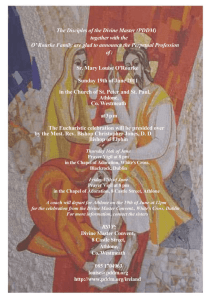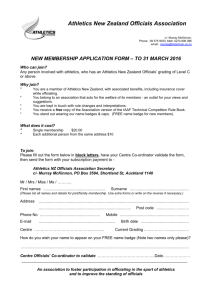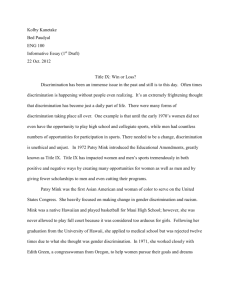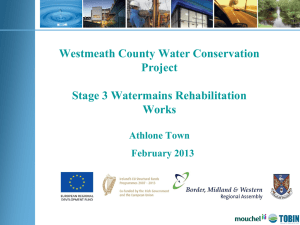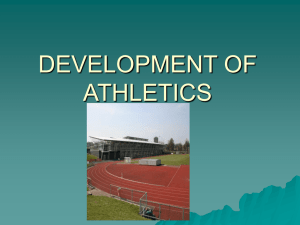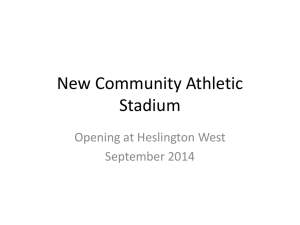Athlone Institute of Technology – Sports Department
advertisement
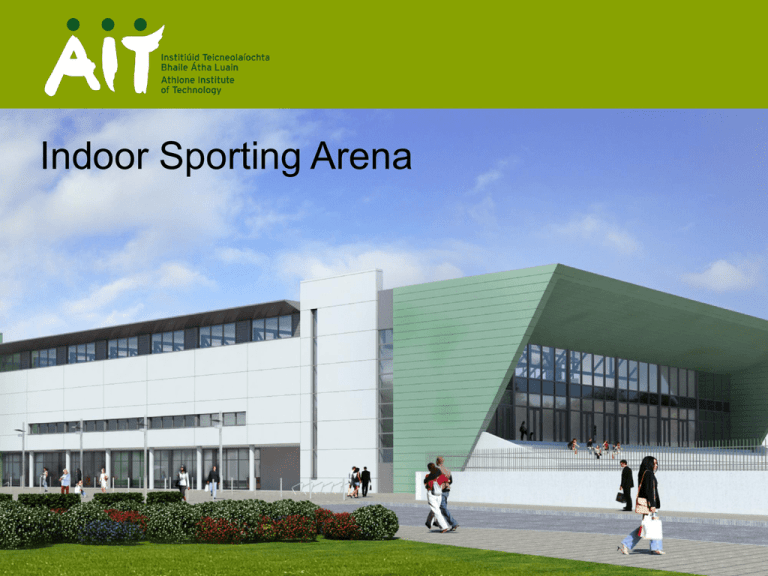
Indoor Sporting Arena Proposed Development • Size of building: 12,000m2 • The main functions of the facility are: – the athletics arena – the multi-sport arena – the outdoor stand to serve the existing track • There are also comprehensive support facilities for elite athlete training, medical facilities and café, general changing facilities Proposed Facilities Present Situation • Lack of quality indoor facilities in Ireland • Extensive community needs • Lack of running track is a barrier to the development of athletics in the Athlone region for able-bodied and special needs athletes • Boost to AIT hosting of HSE Community Games National Finals NGB Support Sought & Consultants • International athlete – Eamonn Coghlan • Athletics Ireland – John Foley, CEO • Football Association of Ireland – Paddy McCaul, President • Irish Institute of Sport – Gary Keegan • Westmeath/Leinster GAA – Tom Farrell • Athlone Town Council Public Use • • • • • • • • • • • AC Celtic FC Roscommon AC, St Ronan’s AC Buccaneers RFC Westmeath GAA All-army regional & national athletics finals Connacht schools track & field HSE Community Games Athlone & District Schoolboy League squads Connacht rugby u-20 development squad Athletics Ireland development squads Various county hurling and football teams for friendly inter-county matches Event Hosting Proven Ability & Facilities to Host & Manage Events • HSE Community Games National Finals hosts 2009-2012 • Celtic Games, AAI Games hosts • Excellent car parking, catering, etc. • Central location of institute to all major transport routes • Athlone Hospital, Portiuncla Hospital, Tullamore Hospital, abundant sports physiotherapists • Airports: Knock 45mins, Dublin 1½hrs, Shannon 2hrs Justification for Facility • First mover advantage – no comparable track or facility in Ireland • NGBs supporting this ambitious plan • Strong support of local and regional clubs • Complements AIT’s outdoor track and astro-turf pitch • Increases attractiveness of institute for students • Enhances facilities for existing students, staff and community Olympics 2012 • Prime location for Olympic 2012 team training camps • General hospitals • Sports physiotherapists • Local and national transport services • Accommodation (abundant Section 50) • Access to airports Enhancement of Existing Facilities on Campus • • • • • • • • • • Multi-purpose sports hall Fully equipped fitness suite Aerobics/circuit training area Full-size GAA and soccer pitches IAAF-approved athletics track FIFA 2-star artificial soccer pitch Cross-country track Lecture/meeting rooms Extensive canteen facilities Parking Management • Staff of the institute sports department to manage, maintain and market the new facilities • Available to community groups, schools, Rapid initiatives Main Elements of Building • Indoor athletics track and field auditorium: – 200m banked running track – spectator seating for 1,500 persons – elevated athlete warm-up area with an 80m sprint track • Separate multipurpose indoor sports auditorium: – basketball/futsal, multi-sports – spectator seating for 1,500 persons • Potential for 3,500 spectators in concert setting Main Elements of Building • 500-person outdoor spectator stand overlooking the existing 400m outdoor track and field facility, with finish line control room • Ancillary accommodation including: – – – – – – 10 changing room facilities gymnasium high-performance training rooms recovery suite medical centre and support rooms café/restaurant Building Materials • The materials of the building are primarily a palette of three high quality materials: – Portland concrete panel – green copper panel – thermally broken, solar glare-reducing double glazing • It is deliberately chosen to avoid metal panelling Environmental Considerations • The building incorporates all accepted passive and sustainable technology, including rainwater harvesting, high degrees of insulation • The main athletics arena is naturally lit to reduce running cost, with lights used rarely • The auditoriums are naturally ventilated. The preferred ambient temperature of a sports centre – 16 degrees – facilitates lowest possible energy use for a building of this type

